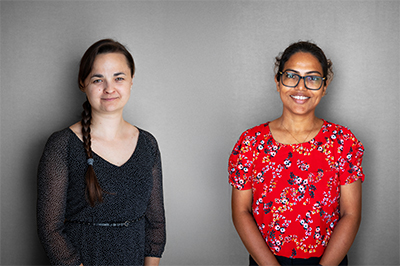ITQB NOVA welcomes two researchers with Marie Curie Fellowships
Oeiras, 22 October 2024
Elena Karnišová Potocká and Sasmita Panda join ITQB NOVA under the 2023 Marie Curie Postdoctoral Fellowship call.
With more than 10 years of experience in the field of enzymatic catalysis with glycoside hydrolases, Elena Karnišová Potocká joins ITQB NOVA with a Marie Skłodowska-Curie Actions (MSCA) Fellowship. She will work on the COxEnzymes – AGs project at the Bioorganic Chemistry and Microbial & Enzyme Technology laboratories, in collaboration with the Bacterial Evolution and Molecular Epidemiology laboratory. The postdoctoral researcher obtained her PhD at the Slovak University of Technology in Bratislava, Slovakia, in 2017 and was working at the Institute of Chemistry, Slovak Academy of Sciences before coming to ITQB NOVA. Her current project aims to use a toolbox of enzymes, pyranose and galactose oxidases, to generate a library of bioactive compounds as promising candidates with health benefits and/or antimicrobial activity.
On the other hand, Sasmita Panda joins the Bacterial Cell Biology laboratory with an ERA Fellowship, to work on the Septal_PG_Hydrolases project. She received her PhD in Biotechnology from DBT-Institute of Life Sciences, Bhubaneswar, India, followed by a postdoc at the Center for Staphylococcal Research at University of Nebraska Medical Center, Omaha, USA. As a bacterial geneticist, identifying bacterial vulnerabilities has always been central to her research. The funded EU project aims at identifying a group of proteins, peptidoglycan hydrolases, involved in septum splitting in the bacterial pathogen Staphylococcus aureus – of which the multi-resistant form is the second major cause of death by antibiotic resistant infections -, their localization and regulation mechanisms. Premature splitting can expose an immature bacterial cell surface, leading to pathogen elimination by the host's immune system. Understanding this process will provide us with the clues to tackle staphylococcal infections in future.
 The Marie Skłodowska-Curie Actions are the European Union’s reference programme for doctoral education and postdoctoral training. They contribute to excellent research, boosting jobs, growth and investment by equipping researchers with new knowledge and skills. Its Postdoctoral Fellowships aim to support researchers’ careers and foster excellence in research. Applicants should be eager to pursue activities abroad, acquire new skills and develop their careers.
The Marie Skłodowska-Curie Actions are the European Union’s reference programme for doctoral education and postdoctoral training. They contribute to excellent research, boosting jobs, growth and investment by equipping researchers with new knowledge and skills. Its Postdoctoral Fellowships aim to support researchers’ careers and foster excellence in research. Applicants should be eager to pursue activities abroad, acquire new skills and develop their careers.
The ERA Fellowships are funded under the Widening Participation and Spreading Excellence part of the Horizon Europe Work Programme, and build on the MSCA Postdoctoral Fellowships actions. ERA fellowships are open to researchers of any nationality, who wish to undertake cross-border mobility to engage in R&I projects at host organizations located in Widening Countries (including Portugal).
Overall, 1737 MSCA Fellowships and 50 ERA fellowships have been selected in the 2023 call, representing an investment of 260M€.







